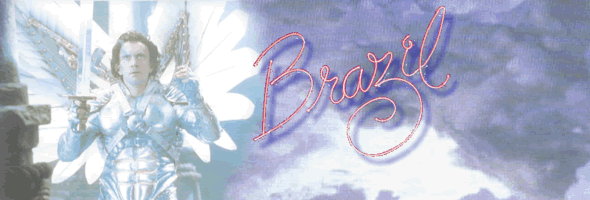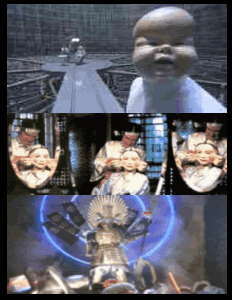
Color, 1985, 142 mins. Directed by Terry Gilliam
Starring Jonathan Pryce, Robert De Niro, Katherine Helmond, Kim Griest, Ian Holm, Bob Hoskins, Michael Palin / Produced by Arnon Milchan / Written by Terry GIlliam, Tom Stoppard & Charles McKeown / Music by Michael Kamen
Format: DVD - Criterion (MSRP $59.95)
In an Orwellian future state (i.e., the present day but thinly disguised with techno trappings), a downtrodden bureaucratic underling named Sam Lowry (Jonathan Pryce before his Miss Saigon days) finds himself accidentally thrust into a chaotic clash between the established order and a clandestine terrorist group consisting of Harry Tuttle (Robert De Niro) and Jill Layton (Kim Griest), who bears a striking resemblance to a damsel in distress in Sam's dreams. Meanwhile Sam's mother, Ida (Katherine Helmond) gets continuous facelifts and goes on shopping sprees while his friend Jack (Michael Palin) reassures him about the superiority of the status quo. Less a linear storyline than a dizzying collision of images and sketches, Brazil expounds upon the surreal world first introduced in Gilliam's short film opener to Monty Python's The Meaning of Life. In that sketch, a band of corporate pirates (literally) attacks rival companies through weapons of bureaucracy; here, however, the power of the omniscient governing force retains the upper hand, at least as far as physical domination goes. Startling, grotesque imagery in the Gilliam tradition fits perfectly within the nightmarish logic of a world where paperwork literally smothers and innocents Of equal significance, Brazil also marks the frenzied pinnacle of a strange and wonderful wave of science fiction and horror films beginning in the early 1980s which flowed against the enforced stream of feel-good, viewer friendly aliens and spaceships forced on audiences during the Reagan era. Though seemingly different on the surface, films like Brazil, Blade Runner, John Carpenter's The Thing, and on a different tier, The Hunger and Videodrome, are essentially variations on the same hi-tech, low-communication world in which the human body and spirit are constantly under siege by a malevolent force which eventually turns people against each other and affects their own state of mental well-being. Not surprisingly, all of these films look far more chilling and modern now than when they were released, and in many respects Gilliam's work is the equivalent of the modern Jonathan Swift portion of this world, jabbing and chortling in defiance of a inhuman government gone catastrophically wrong.
As for the quality of the film itself, Brazil has never looked better. Though derived from the same materials, the Criterion transfer looks more polished and less grainy than the Universal DVD and, being DVD, features somewhat more dimensional shadows than the laser. This master always looked great, and even without anamorphic enhancement, it's hard to imagine the film getting much better. The shots of neon and planes of glittering metal come off especially well here, and Sam's memorable dream sequences look smooth and luminous. The extras, however, are what really make the Criterion edition a must have. The 30 minute documentary "What Is Brazil?" kicks things off with an amusing promo piece shot during production of the film, before things turned nasty during distribution, and features some location footage of the striking, unused dream sequence in which Sam is observed by thousands of eyeballs on the ground. A one hour original documentary for Criterion essentially translates the fascinating written account, The Battle of Brazil, into visual form by interviewing the key participants in the film's production and subsequent studio clash. Gilliam also appears throughout to introduce other behind-the-scenes snippets, such as an informative (if poorly lit) ten minute talk by composer Michael Kamen about his experience with the film. Storyboards, the trailer, production sketches, and other ephemera round out this second supplement-crammed disc, which takes several hours to sift through by itself. However, at least by this point, the supplement format of DVD - simply slapping everything together on a menu - is less engaging than the guided step by step method of laserdisc, but it's all here for anyone anxious to sift through it. The third disc closes out with the so-called "Love Conquers All" cut, a radically reedited version shown on syndicated TV which streamlines Gilliam's dark satire into a toothless, feel-good chunk of eye candy. Fascinating and appalling at the same time, this is one of the most welcome, surreal supplements available on home video and a chilling reminder of just how easily a good film can be sabotaged in the post-production process. Along with 12 Monkeys and Criterion's Time Bandits, this should be more than enough to tide over Gilliamphiles for a while and continues to stand as a loving testament to a unique and intensely personal work of cinema.
Having set the standard for comprehensive special editions with their deluxe laserdisc box set of Brazil, Criterion now replicates the experience into a three DVD package which offers everything you could possibly want to know about this controversial, stunning film, the most ambitious achievement from former Monty Python member Terry Gilliam. Brazil became the thorn in Universal execs' sides when the studio planned to drastically recut the film into a more upbeat experience (the same year a similar fate befell Ridley Scott's Legend). Fortunately, Gilliam stood by his film and arranged a clandestine screening whereupon it became a critical cause de celebre and was saved from the execs' scissors. However, the film's longer European cut raised issues as to which version Gilliam truly preferred; after a seemingly infinite period of tinkering and research, the final "director's cut" (approximately 11 minutes longer than the 131 minute U.S. print) was assembled and released by Criterion. The same edition made its debut on DVD last year in a bare bones version from Universal; however, the film's fans who want the full package in a nice tidy box will want to pick up handsomely packaged rendition, though laser owners will have little reason to upgrade besides the cool-looking DVD sleeve.
 are haphazardly tortured and killed at the mistaken whims of a faceless giant. (See Michele Soavi's Dellamorte Dellamore for a similarly paper-driven and self-contained world view.) While Gilliam's abrasive, rapid-fire mixture of black humor and futuristic social horror isn't to everyone's taste, the film is unquestionably a technical triumph in every regard; the visual design, music, acting, and photography are never less than pitch perfect throughout.
are haphazardly tortured and killed at the mistaken whims of a faceless giant. (See Michele Soavi's Dellamorte Dellamore for a similarly paper-driven and self-contained world view.) While Gilliam's abrasive, rapid-fire mixture of black humor and futuristic social horror isn't to everyone's taste, the film is unquestionably a technical triumph in every regard; the visual design, music, acting, and photography are never less than pitch perfect throughout.
